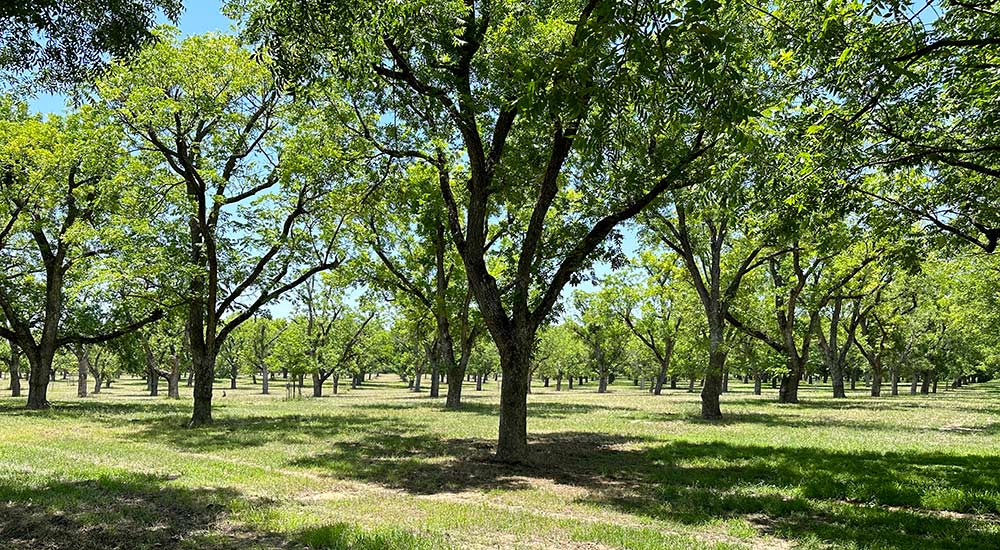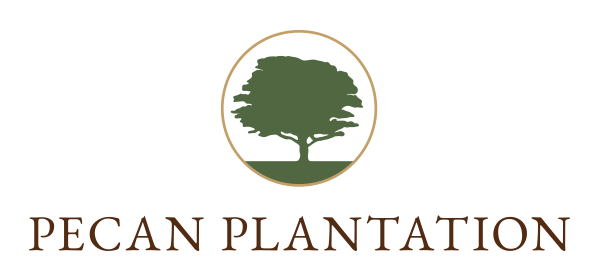Request a Property Tour Today! Call or text (833) 273-2159

The Land Report: Pecan Plantation
On a fertile peninsula in Hood County, Texas, the heirs of O.P. Leonard are writing a new chapter with their land thanks to a ground-breaking development deal at Pecan Plantation. Throughout the 20th century, this storied Fort Worth family made its mark with innovative ventures, such as a pioneering department store and the largest pecan operation in the US.
That tradition continues today, 35 miles southwest of Fort Worth with Pecan Plantation, which encompasses 4,200 acres surrounded by the Brazos River. In the late 1920s, a settler named John Christensen tried to transform the area into a farming community. Few could blame him for considering the area a utopia, with its pristine riverfront, sandy loam soil, and abundance of trees.
Leonard Brothers
Enter “Mr. Obie.” In 1918, Obadiah Paul Leonard and his brother Marvin founded Leonard Brothers, a department store in downtown Fort Worth that was the site of the first escalator in Texas and the only private subway in US history.
“You could buy everything in Leonard Brothers except liquor or an automobile,” says Mr. Obie’s son-in-law, Jim Anthony. After marrying Mr. Obie’s daughter Jane, Anthony shuttered his dental practice and began managing the family’s extensive landholdings.
Mr. Obie had a passion for farmland. In the 1930s, he purchased properties in Hood and Wharton Counties. In 1933, he planted 400 acres of pecan trees, a species native to the South. At its peak, the family cultivated pecans on 6,600 acres in Arkansas, Missouri, New Mexico, Oklahoma, and Texas, where it ranked as the state’s largest producer.
In 1974, the family harvested 4.5 million pounds of pecans on Leonard Bend Farm, the current site of Pecan Plantation. Mr. Obie started acquiring that acreage in the late 1940s. Initially, he interplanted peach and pecan trees.
“Peach trees come into production earlier than pecan trees, and it would give us a revenue stream while waiting for the pecan trees to mature,” Anthony explained. “Those peaches would be harvested, and we would take them to Fort Worth to the department store, where they would be merchandised as a loss leader. Homegrown peaches from the Leonard Orchards became a very popular thing.”
Pecan Plantation
What happened next was a total game changer. In 1966, the Brazos River Authority began construction of the De Cordova Bend Dam. Completed in 1969, it led to the creation of Lake Granbury, an 8,300-acre reservoir an hour from downtown Fort Worth. This massive project spurred the family’s interest in land development. From the outset, the clan flipped the script on the standard buildout model of the early 1970s.
“Unlike a lot of other developers, instead of promising all types of improvements, we paid for the amenities ourselves, all the infrastructure, and everything up front before we started selling,” Anthony says. Before the first lot sold, a clubhouse, a marina, and tennis courts were in place. Superior amenities became standard operating procedure. Today, Pecan Plantation has its own country club complete with a swimming pool, tennis courts, and an 18-hole championship golf course; a second, private 18-hole golf club; two airports; acres of beaches and parks along the Brazos River; campgrounds; and stables.
what are you waiting for?
This is a very unique opportunity to live in one of the most amenity-rich communities in Texas. Come experience all that Pecan Plantation has to offer.

